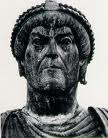 It’s true enough, as Vatican lawyer Jeffrey
It’s true enough, as Vatican lawyer Jeffrey
Lena points out,
that when the Supreme Court declines to hear a case, that cannot be
taken as a pronouncement on the merits. Still, it’s interesting that the
court lacked four votes to take up Doe v. Holy See, the
Oregon lawsuit in which an anonymous plaintiff is seeking to get the
Vatican to pay damages for his having been abused years ago by a now
deceased priest. The case involves a threshold issue over whether such a
suit is allowable under the 1976 Foreign Sovereign
Immunities Act, and you’d think that if the justices considered it a
slam dunk for the defense, they would have granted certiorari rather
than let the trial go forward.
Be that as it may, the question of whether priests are employees of the
Holy See seems a bit more complicated than recognizing (as Lena
would have it) that the
Holy See does not pay their salary and benefits or exercise day-to-day
control over their work. The person who does those things is the bishop,
and these days Catholic bishops themselves look increasingly like
Vatican employees.
Admittedly, Catholic ecclesiology does not neatly track U.S. employment
law, but if the pope hires and fires bishops, and can create commissions
of bishops to put a national church in order, and can order cardinals
not to criticize each other, then it sure looks as though they
are wholly subject to papal authority. So why exactly should the sins of
these sons not be visited upon the Holy Father?
Coincidentally, the Supreme Court’s decision to let Holy See proceed
occurred the same week that the Vatican announced
a replacement for Cardinal Walter Kaspar, President of the Pontifical
Council for Promoting Christian Unity and
the Commission for Religious Relations with Jews. When Pope Benedict was
cardinal in charge of the Congregation for the Doctrine of the Faith,
the two got into a spirited public
debate over Kaspar’s charge that the Vatican was arrogating
inappropriate centralized power to itself over the authority of the
bishops. Ratzinger vigorously denied it, of course, but one might see Doe
v. Holy See as a Kasparian chicken coming home to roost.
Update: Interesting reflection
on the issue by Anthony Ruff O.S.B. over on Pray Tell.

